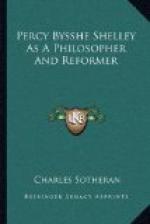The idea of the Supreme Power or God, as emanating from Shelley, is one of the most sublime to be found in the pages of metaphysical learning at the command of ordinary mortals. By many it may be considered only a vague pantheism; yet, rightly regarded in a reconciliative spirit, it is of such an universal character as to harmonize with not only Deism, Theism and Polytheism, but even Atheistical Materialism. Listen to the following, which I select out of numerous examples, as a finger-post for others who seek the living springs of undefiled truth, as in Shelley:
“Whosoever is free from the contamination of luxury and license may go forth to the fields and to the woods, inhaling joyous renovation from the breath of Spring, and catching from the odors and sounds of autumn some diviner mood of sweetest sadness, which improves the softened heart. Whosoever is no deceiver and destroyer of his fellow-men—no liar, no flatterer, no murderer—may walk among his species, deriving, from the communion with all which they contain of beautiful or majestic, some intercourse with the Universal God. Whosoever has maintained with his own heart the strictest correspondence of confidence, who dares to examine and to estimate every imagination which suggests itself to his mind—whosoever is that which he designs to become, and only aspires to that which the divinity of his own nature shall consider and approve—he has already seen God.”
Can any one cavil with these beautiful expressions, this outpouring of genius? If such there be, his heart and understanding must be sadly warped, any appeal would be in vain, for him the Veil of Isis could never be lifted. After a careful study of Shelley’s works I can find nothing to warrant the execration formerly levelled at his head, not even in the “Refutation of Deism,” that remarkable argument in the Socratic style between Eusebes and Theosophus in which, as in all his prose works, is displayed keen discernment, logical acuteness, and close analytical reasoning not surpassed by the greatest philosophers—most certainly his notions of God were not in unison with the current theological ideas, and it was this daring rebellion against the popular faith, the chief support of custom which caused all the trouble. If ever he attempted to show the non-existence of Deity, his negation was solely directed against the gross human notions of a creative power, and ergo a succession of finite creative powers ad infinitum, or a Personal God who has only been acknowledged in the popular teachings as an autocratic tyrant, and as Shelley puts it in his own language:
“A venerable old man, seated on a throne of clouds, his breast the theatre of various passions, analogous to those of humanity, his will changeable and uncertain as that of an earthly king.”
Not to be compared with the far different eternal and infinite.




